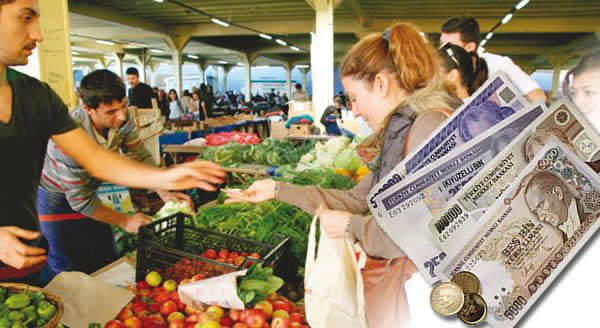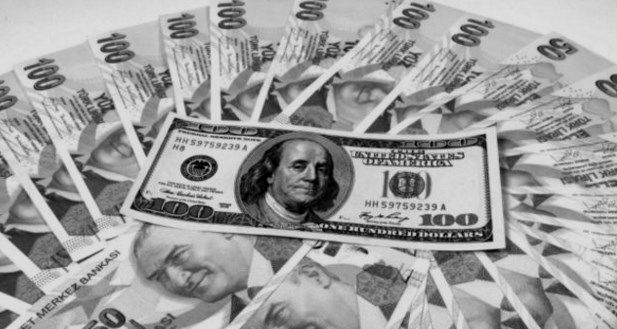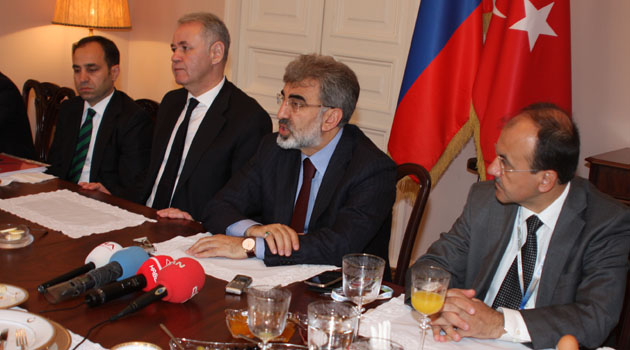Interview: Turkey to Become A Global Power within a Decade?
 The fact that the world is still suffering from global financial crisis has been on our agenda again for a while now.
The fact that the world is still suffering from global financial crisis has been on our agenda again for a while now.
We also know some countries such as Greece and Spain are at a very critical point and would hardly survive without substantial monetary support from EU.
As for Turkey, the country is experienced enough to share its capability to manage such crisis, with other countries. The world’s biggest economies are making efforts to increase production and improve employment based on currency wars, whereas Turkey has emphasized on maintaining a “zero real interest rate” which seems to be consistent with global developments.
Apparently, Turks have hardly been touched by the current global financial crisis. The global crisis has changed Turkish people’s perception of crisis. Despite the crisis, Turkey has been able to keep its economic indicators such as the interest rate, currency rate and inflation etc. stable which in return has caused a majör confidence in the performance of the country.
The political stability has no doubt contributed substantially as well.
The bottom line is if the country (and the people) manage to remain alert, Turkey will waive any prospective economic crisis.
Some experts have a very optimistic view of the Turkish economy and believe it will continue to grow despite any difficulties to arise from global effects. Mr. Bülent Gedikli an AK Party deputy (and a doctor of economy) has drawn attention to the strong position the Turkish economy is in after having gained considerable experience during the last crisis. Down below is an interview with Mr. Gedikli to have a more detailed idea about his approach;
Editor
BUSINESS TURKEY TODAY
INTERVIEW
Stressing that the public finance and financial sectors are in good shape, Gedikli said savings will continue to rise, while the Turkish economy continues to grow. Because the government is focusing on productivity, he says, “Turkey is a rising star owing to its political and economic stability, and will become a global power and even a super state within a decade.”
Referring to the recent pressure put on the central bank to increase interest rates and reduce the current account deficit (CAD), Gedikli said: “It has been strongly recommended that we increase the interest rate. However, the best remedy for the CAD is a lower real interest rate, not a higher one. Besides, the US, the EU and Japan are putting negative interest rates into effect at the present time. The decision of the central bank in its most recent meeting not to increase the interest rate was appropriate.”
Gedikli remarked that the AK Party is eager to achieve its 2023 goals even before this deadline and said the people voted the party into power for the third time in a row because they believe in these goals as well. Noting that winning the vote of one out of every two voters is a privilege, Gedikli says that the common problem of those countries suffering most in the crisis is lack of strong leadership.
Stressing that the principle of the social state has been on the decline in the EU, Gedikli says the deterioration in the social rights of the poor is the most dramatic outcome of the ongoing crisis in these countries. He says the social state is on the rise in Turkey, however.
You mentioned the crisis in the global economy: How do you see the future of this crisis unfolding?
Four players are key in the world economic game: the US, the EU, China and Japan. Each of them is working hard to improve employment levels. For this reason, they are waging currency wars with each other. Each wants to see their currency devalued. To this end, they make maneuvers: It’s like four wrestlers wrestling, but none wins.
Most EU countries are suffering from a debt crisis. This creates a huge burden on their state budgets. These states are shedding their characteristics as social states, causing thousands to protest in Europe. It appears that the situation will remain chaotic for some years to come.
There is a similar situation in the US as well. The debt and revenue crisis is still considerable, and there are disagreements among decision makers as to how to handle it, which makes the problem even more difficult. Japan, on the other hand, is struggling with a liquidity trap. But it also used the earthquake as a pretext to coin a large amount of yen. China does not intend to increase its domestic demand. It seeks to remain an exporting machine by restraining the internal demand.
What do you think of the prime minister’s emphasis on the “zero real interest rate” given the current pressure to increase rates?
To address the debt crisis, the EU and US increased the amount of liquidity in the market, and in spite of this, there is no imminent danger of inflation in the world. There is no problem with interest rates, either. The rates are close to zero. It is as though the world has raised the interest rate. The whole fight now is for growth and employment. From this perspective, the prime minister’s remark was exactly appropriate.
So this is the situation in the world; how are things in Turkey?
Those who claim to see a great danger of inflation and a need to increase interest rates are either being manipulated, or they’re just wrong. Turkey does not have a leadership problem. The countries I just referred to lack strong leadership. The US, Germany, France and Japan are all experiencing this problem right now. Strong leadership is the major distinction between Turkey and other countries: Political stability is Turkey’s greatest advantage. Turkey is currently the most popular country in its region and in the world.
lnterest rates are still high in Turkey. Because the budget balance is so strong, there is no foreseeable problem at all with respect to governmental fiscal discipline in 2011, 2012 or 2013. Trends suggest that interest rates will decline further. The restructuring of taxes and outstanding debts has been a great advantage to Turkey, and now is a good time to buy Turkish bonds.
I guess because the crisis was managed well in Turkey, the people aren’t afraid of a future crisis?
This is exactly what I am trying to say. Turkey now has a positive experience of crisis management. Our people have hardly been touched by the current global financial crisis. If we remain cautious, Turkey will weather any other possible world economic crisis. This event has changed our people’s perception of crisis. Despite this crisis, the interest rate, exchange rate and inflation, as well as other indicators, remained stable. Now all are confident in Turkey’s performance. The primary factor behind our confidence is political stability, which promotes economic stability.
The public finance and financial sectors are in good shape, the amount of savings will continue to rise, and the Turkish national economy will continue to grow. We have to remain focused on exports and maintain a high quality of production. We have to locate additional markets and expand in the European markets. In other words, Turkey has to become a country that sells its goods to foreign countries rather than importing their products.
As long as it relies on an economy of productivity, Turkey, a rising star owing to political and economic stability, will become a global power and even a super state within a decade.
So are you saying that Turkey will achieve the 2023 goals?
We [the AK Party government] want this and so do the people. Political stability is pretty important for the achievement of the 2023 goals. We have held a recent election; and our government enjoys the support of 50 percent of the voters. One out of two voters preferred our party and extended support for the third time in a row. We have not relied on populist policies or an election economy to accomplish this. The opposition, despite making extreme promises, was not supported by the people. We have a strong economy and political stability.
Going back to the EU, will they be able to strike a balance between the social state principle and crisis management?
This is the most dramatic part of the crisis, I think. The EU countries are losing their character as social states. Turkey, on the other hand, is becoming a social state. We have made great progress in the care of the handicapped and the elderly. Aid for the poor is becoming more systematized. We are ahead of many EU countries in terms of the social state principle. Unlike the EU countries, our quality as a social state is becoming stronger and more visible, and we are able to manage crises pretty successfully.
There is controversy around the current account deficit. How would you respond to the view that this gap should be addressed by increasing interest rates?
From one perspective, the CAD is a problem of savings. When domestic savings are not enough, external borrowing becomes an option. We have to make a call for saving and also diversify the saving mechanisms. There are individual retirement and unemployment funds as well as other similar saving devices available in Turkey. In addition, the government’s housing policy serves as a significant tool of savings. On the other hand, there are recommendations afoot to increase interest rates to address the CAD, but the appropriate remedy for the current deficit is a lower real interest rate, not a higher one. The US, the EU and Japan are maintaining below-zero real interest rates at the present time. The central bank’s decision in their most recent meeting not to increase the interest rate was appropriate.
What will be the most significant values and principles for economies in the new era?
Three values will be most significant in the upcoming era: First, the culture of entrepreneurship; secondly, planned and disciplined work; and third, sharing and altruism.
A nation’s wealth grows with the spread of a culture of entrepreneurship. We have to create an environment where a greater number of entrepreneurs will be trained and educated. Whoever pays the greatest attention to entrepreneurs will see the greatest profit and benefit. Entrepreneurism is the core of wealth. But what entrepreneurs need to succeed are resources and savings.
No to the three Cs
The agenda is changing rapidly in light of unexpected surprises and crises, things like the recent parliamentary oath boycott, renewed terrorism; don’t these things affect stability?
We have clear measures and solutions in place to address these issues; we are determined not to allow the 3 Cs to affect us.
What are these three Cs?
Three notions based on life experience: consternation, chaos and crisis. In the past, the will of the people has been effectively and deliberately blocked and undermined by these three things. The government and legislation have been paralyzed. From here on out, no one will be able to use these channels to manipulate the public or the government.
Fears were fabricated from conjecture as part of a vicious cycle. First communism, and then separation and backwardness were identified as sources for fear. Enmities were fabricated with our neighbors, including Russia, Iran and Iraq. The fear that was generated was promoted in an attempt to magnify political crises and set popular choice aside. No one will do this anymore. Problems will be resolved without causing a crisis or chaos.
Historically, the leaders of coups drafted new constitutions in the wake of such “crisis and chaos.” Will we be able to make a civilian constitution now?
We are determined to do so, and the other parties also made promises to that effect during their election campaigns. We are preparing for the process; it will include all segments of society and the participation of civil society organizations. We have set up a separate commission to ensure that the process advances smoothly.
The economy should be considered together with democracy. Improved democracy will also improve the economy, and economic growth will have a positive impact upon the quality of democracy. We have been taking steps to improve both. The middle class is gaining strength owing to our recent steps. This also consolidates democracy.
How would you respond to criticism of the distribution of income in Turkey?
We are experiencing a very successful period in that regard, and our success will be even more apparent in the years to come. The number of people with a daily income lower than $2 is nearing zero. The ratio of the poor to the overall population has declined from 28 to 18 percent. The people are taking to the streets in EU countries due to growing poverty, but in our country poverty is in decline and the middle class is growing. This is why we have received the people’s mandate for a third time.
International credit rating institutions are biased
Do you think the credit rating institutions are being unfair to Turkey?
“Unfair” isn’t strong enough to describe their attitude. These institutions have lost their credibility due to their subjective analyses. We have some clear examples: Greece and Portugal enjoyed better credit ratings than Turkey for months [after their respective crises]. Even Tunisia has a better rating than Turkey’s, and so does Greek Cyprus. Anyone who adopts an objective approach will conclude that Turkey’s rating should be increased.
Do you think that they are not doing this because the investment rating is a critical threshold?
There are some other reasons and intentions behind it. Isn’t the timing of their statements interesting? What would Turkey’s rating be if it were based on an objective evaluation? Turkey should have attained the level of an “investible country.” Turkey has done this even if the rating institutions don’t agree.
Turkey is a country that has created an international investment chain from the contributions of successful businessmen. Our contractors hold the number one places for World Bank tender bids. In the overall ranking, they hold second place. The Turkish schools also play significant roles in this endeavor. However, the bureaucracy should keep up with the economy’s improved performance and act accordingly. We have already seen some changes in bureaucratic circles, but this is not enough.
07 August 2011
SOURCE: TODAYS ZAMAN





